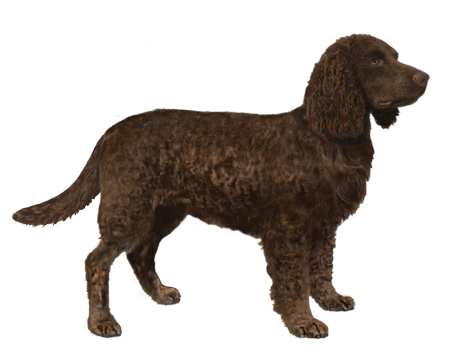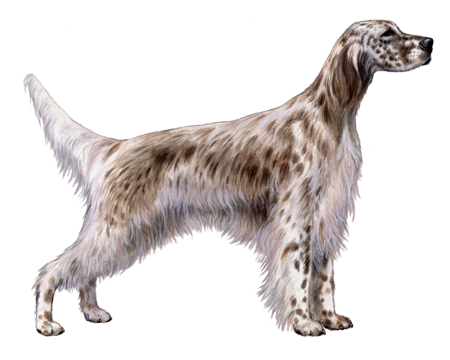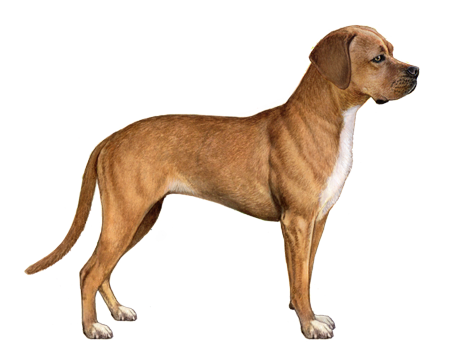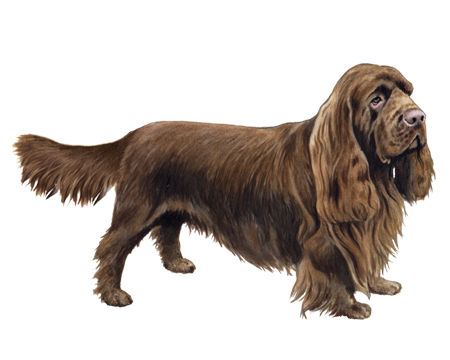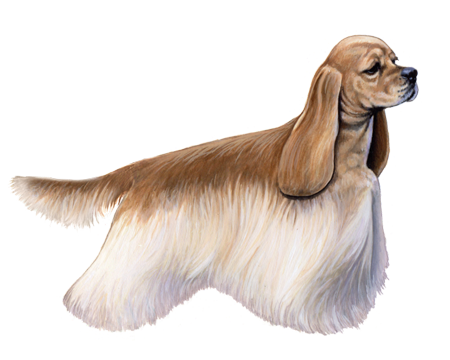
American Cocker Spaniel
The American Cocker Spaniel is an intelligent, happy, and playful dog. Originally bred for hunting, American Cocker Spaniels have become popular family pets—in part because of their convenient size. They’re big enough to participate in busy family life activities, yet small enough to pack up and take on outings.
Interested in discovering if your dog is an American Cocker Spaniel?
Check out Wisdom Panel's DNA tests.

American Cocker Spaniel Traits
General Appearance
American Cocker Spaniels have sturdy, compact bodies and chiseled, refined heads. Their strong backs slope slightly downward from their shoulders to their tails. The breed is well-balanced and built for both speed and endurance.
Coat and Colouring
The hair on the top of the American Cocker Spaniel’s head is short and fine, while the hair on the body is medium length with enough undercoating to give them protection. Their ears, chest, stomach, and legs are well-feathered. American Cocker Spaniels are known for their silky coats, which are flat or slightly wavy.
This breed comes in solid colors with tan points or parti-color. Ticking or white markings are also possible. The underlying color varies widely. It can be black or a color ranging from pale cream to a deep red, including roan and silver.
Distinctive Physical Traits
The American Cocker Spaniel’s eyes are round and full and look directly forward. They’re dark brown and appear slightly almond-shaped due to the shape of the eye rims.
American Cocker Spaniels have recognizable ears—long, lobular-shaped, and well-feathered. The Cocker Spaniel’s tail is set on a line with the topline of the back (or slightly higher) and wags happily when the dog is in motion.
American Cocker Spaniel Temperament
American Cocker Spaniels are an excellent breed for families. They’re lively, playful, devoted to their owners, and usually wonderful with children.
With a sweet disposition, American Cocker Spaniels are generally sensitive dogs. They’re equally happy participating in active family outings or cuddling on the couch with their people. As an alert and happy breed, some American Cocker Spaniels can be very energetic. So, regular exercise is always important.
American Cocker Spaniels are typically friendly towards other dogs and pets, provided they are socialized with them from puppyhood. And while they’re great with people they know, they may benefit from intentional socialization with strangers.


American Cocker Spaniel History
Some experts believe the ancestor of the American Cocker Spaniel—the English Cocker Spaniel—was on the Mayflower when the ship arrived in the Americas in 1620. From there, Cocker Spaniels became the constant companions of settlers, taking on prominent roles as family guards and hunters.
The American Cocker Spaniel is more petite than its ancestor, the English Cocker Spaniel. In fact, it’s the smallest dog in the entire Sporting breed group.
Though American Cocker Spaniels excel as hunting dogs, they’re equally suited to life as household pets. As a result, they’ve been extremely popular in the United States for decades. So much so that classic books and movies have often portrayed the breed (e.g., “Spot” in the Dick and Jane series, “Lady” in Disney’s Lady and the Tramp).
American Cocker Spaniel Care
Nutrition
American Cocker Spaniels require high-quality food that’s appropriate for their current life stage (e.g., puppy, adult, senior). A diet made for medium-sized dogs or one specifically formulated for American Cocker Spaniels are good options to consider.
American Cocker Spaniels are prone to becoming overweight. Therefore, track food portions and treats carefully to help prevent weight gain. Measuring food using a standard measuring cup will help prevent you from overfeeding. But be sure to include treat calories when calculating your dog’s daily needs. Generally speaking, treats should make up no more than 10% of their calories for the day.
Grooming
American Cocker Spaniels’ coats are prone to tangles and mats if not groomed regularly. Experts recommend daily brushing to keep them healthy and free of loose hair. First, use a medium comb, followed by a once-over with a slicker brush. Many American Cocker Spaniel owners use professional grooming services to keep their dog’s coat looking its best.
The American Cocker Spaniel’s long ears can make the breed more susceptible to ear infections. So, you should check and clean your dog’s ears routinely to prevent infections.
While grooming, also take time to check your American Cocker Spaniel’s nails and trim them as needed to keep them short and tidy.
Dental care is an integral part of any dog’s long-term health. In addition to professional dental cleanings, be sure to establish an at-home dental care routine, including regular teeth-brushing and dental treats or toys.
Exercise
Bred to be active hunting dogs, American Cocker Spaniels need a lot of exercise to burn off their vast amounts of energy. Since they love spending time outdoors with their families, long walks and hikes are a great way to provide them with the regular exercise they need to thrive.
American Cocker Spaniels also seem to enjoy dog sports such as hunting, tracking, retrieving, agility, rally, and competitive obedience.
Training
American Cocker Spaniels respond well to reward-based training. Since they’re commonly quite food-motivated, you can offer treats as rewards for giving up inappropriate objects they’ve retrieved. Likewise, treats may help you manage any tendency your dog has for guarding items not intended as toys.
Occasionally, American Cocker Spaniels display fearful behaviors. Reward-based training can also help to minimize these.

American Cocker Spaniel Genetic Health Conditions
-
Bernard-Soulier Syndrome (Discovered in the Cocker Spaniel)
Bernard-Soulier Syndrome (BSS) is a bleeding disorder in which platelets cannot bind together normally, leading to delayed blood clotting. The condition is characterized by larger than normal platelets and variably low platelet numbers, known as macrothrombocytopenia. The associated genetic variant has been identified in the Cocker Spaniel.
-
Chondrodystrophy (CDDY) and Intervertebral Disc Disease (IVDD) Risk
Chondrodystrophy (CDDY) is a skeletal disorder characterized by shortened limbs and abnormal early degeneration of the spinal discs, or intervertebral disc disease (IVDD), which predisposes to disc herniation.
-
Phosphofructokinase Deficiency
Phosphofructokinase Deficiency (PFK) is a disorder where an enzyme important in the production of energy from sugars is lacking, resulting in weakness, muscle cramps, discolored urine, anemia, and jaundice.
Knowing if your American Cocker Spaniel is a carrier or at-risk for these conditions can help you and your veterinarian plan for your pup's lifelong care. With Wisdom Panel™ Premium, you can get results for over 200 genetic health tests.
Breed Group
Sporting
The sporting group breeds are incredibly diverse in personality and appearance, but can be characterized as very sturdy. They were developed to work closely with people and in general have a very responsive nature and high intelligence.
Resources
https://www.akc.org/dog-breeds/cocker-spaniel/
https://vcahospitals.com/know-your-pet/dog-breeds/american-cocker-spaniel
http://www.fci.be/Nomenclature/Standards/167g08-en.pdf
https://americanspanielclub.org
https://vcahospitals.com/know-your-pet/dog-breeds/american-cocker-spaniel
Reviewed 26 July 2020 by Annette Louviere, DVM




